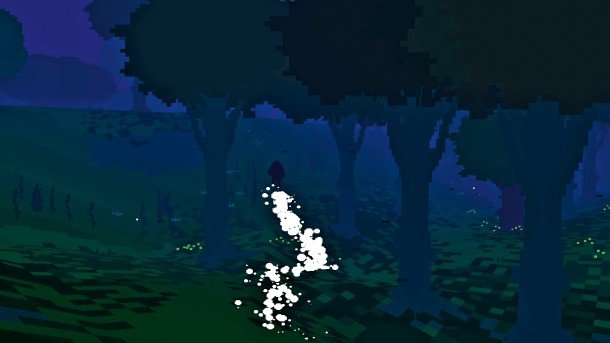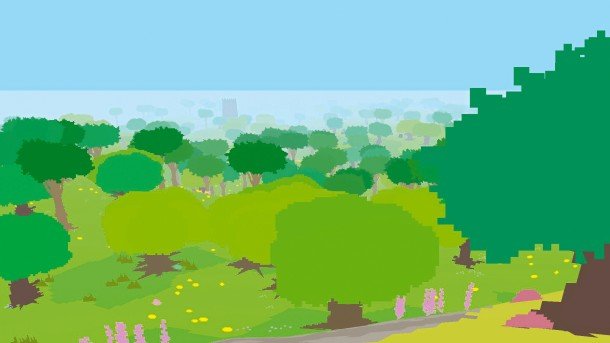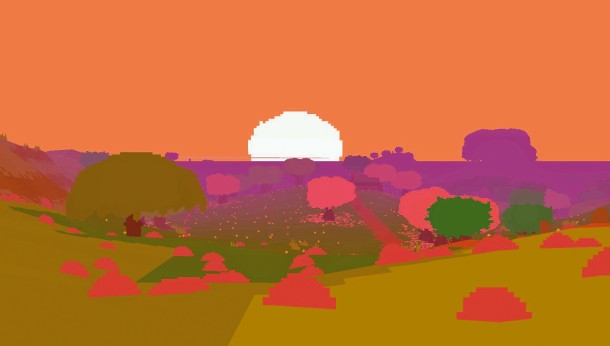Our Verdict
An inspired dynamic score makes for some sublime hiking, but its somewhat slim and repetitive for the asking price.
PC Gamer's got your back
Proteus is a peaceful first-person exploration game set on a cheery pixellated island. There are no enemies. You can't die. You can't jump, shoot, dodge or pick anything up. Your only objective is to roam, observe and enjoy the evolving soundtrack triggered by your path. You'll encounter more danger doing a lap of Kew Gardens than exploring Proteus's serene, procedurally generated world.
"Your only objective is to roam, observe and enjoy the evolving soundtrack."
Once you've spawned at sea and wandered ashore, you can start getting a feel for the island's layout. Every playthrough rearranges a series of geographical elements that you'll come to recognise, like an abandoned shack, some mysterious ruins, and a strange circle of stone animal carvings that regularly grace the peak of one of Proteus's easily scaled mountains.
By day, there's no purpose to your exploration. At night, you'll discover a delightful way to shift the island to its next phase, which I won't spoil. The change alters the island's weather, colour palette and wildlife, and evolves the soundscape.

If you have a decent pair of headphones, plug them in for Proteus. The island responds to your rambling with a deeply satisfying emergent arrangement. The hop and flutter of Proteus's creatures is accompanied by an electronic riff. The hoot of a digitised clarinet serves as the call of an owl. Flies swarm to the scattered notes of a frenzied cyber-fiddle. Rain falls in cascading chimes. I charged into the midst of every gaggle of monsters and absorbed the resulting wall of sound with childish glee.
"The joy faded in the latter stage - I found myself walking aimlessly, unstimulated and bored."
Proteus captured me completely for the first 20 minutes. I found a weird hopping box creature, and chased it into the sea. I discovered a glittering fallen star that leapt away from my advances. I chased that into the sea as well. Its cheerful chirping fell silent as it vanished beneath the waves, replaced by the calm orchestral hum of the tides and a faint sense of regret. As darkness fell, the sky was suddenly sliced apart by a gleaming meteor shower. With no clear objectives, the joy of discovering the unexpected is the only reason to keep going. That was enough, for a while.
The joy faded in the latter stage of Proteus's 45-minute arc. The creatures that make the first half feel so busy and interesting become increasingly sparse. I found myself walking aimlessly, unstimulated and bored. Proteus's bubbling symphony has a disappointing coda, and you may feel shortchanged by its length.

The procedural generation offers a reason to restart, but the island felt deeply familiar in my playthroughs. Players on Proteus's forums mention a couple of surreal, well-hidden secrets, but my experience each time was largely identical, and I found no deeper meaning or binding narrative to the island's mysterious landmarks. Proteus is mood music. If you're looking for a soothing green oasis to return to every now and then, this will do the job nicely.
Expect to pay: $11 / £7
Release: Out now
Developer: Ed Key and David Kanaga
Publisher: Twisted Tree
Multiplayer: No, lol
Link: www.visitproteus.com
An inspired dynamic score makes for some sublime hiking, but its somewhat slim and repetitive for the asking price.
Part of the UK team, Tom was with PC Gamer at the very beginning of the website's launch—first as a news writer, and then as online editor until his departure in 2020. His specialties are strategy games, action RPGs, hack ‘n slash games, digital card games… basically anything that he can fit on a hard drive. His final boss form is Deckard Cain.



